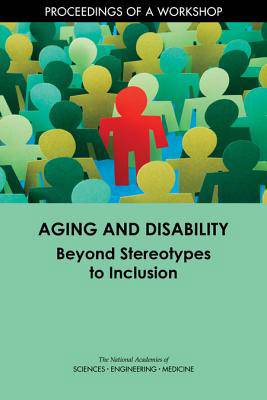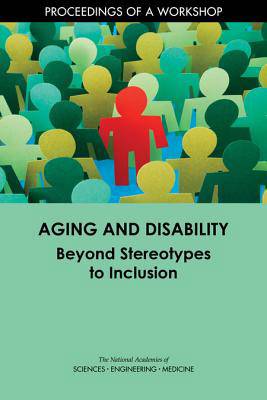
- Afhalen na 1 uur in een winkel met voorraad
- Gratis thuislevering in België vanaf € 30
- Ruim aanbod met 7 miljoen producten
- Afhalen na 1 uur in een winkel met voorraad
- Gratis thuislevering in België vanaf € 30
- Ruim aanbod met 7 miljoen producten
Aging and Disability
Beyond Stereotypes to Inclusion: Proceedings of a Workshop
National Academies of Sciences Engineering and Medicine, Division of Behavioral and Social Sciences and Education, Health and Medicine Division, Board on Health Sciences Policy, Forum on Aging Disability and IndependenceOmschrijving
Many different groups of people are subject to stereotypes. Positive stereotypes (e.g., "older and wiser") may provide a benefit to the relevant groups. However, negative stereotypes of aging and of disability continue to persist and, in some cases, remain socially acceptable. Research has shown that when exposed to negative images of aging, older persons demonstrate poor physical and cognitive performance and function, while those who are exposed to positive images of aging (or who have positive self-perceptions of aging) demonstrate better performance and function. Furthermore, an individual's expectations about and perceptions of aging can predict future health outcomes. To better understand how stereotypes affect older adults and individuals with disabilities, the National Academies of Sciences, Engineering, and Medicine, with support from AARP, convened a public workshop on October 10, 2017. This publication summarizes the presentations and discussions from the workshop.
Specificaties
Betrokkenen
- Auteur(s):
- Uitgeverij:
Inhoud
- Aantal bladzijden:
- 102
- Taal:
- Engels
Eigenschappen
- Productcode (EAN):
- 9780309472296
- Verschijningsdatum:
- 6/07/2018
- Uitvoering:
- Paperback
- Formaat:
- Trade paperback (VS)
- Afmetingen:
- 147 mm x 221 mm
- Gewicht:
- 158 g

Alleen bij Standaard Boekhandel
Beoordelingen
We publiceren alleen reviews die voldoen aan de voorwaarden voor reviews. Bekijk onze voorwaarden voor reviews.











